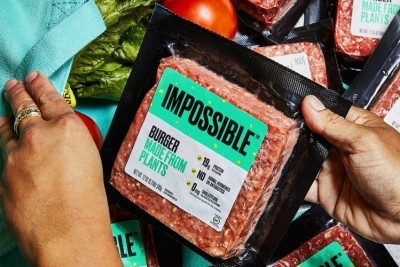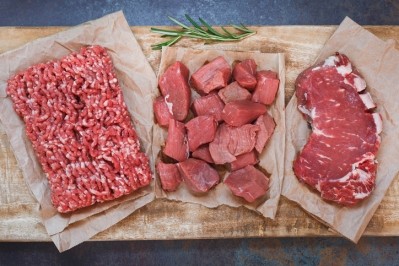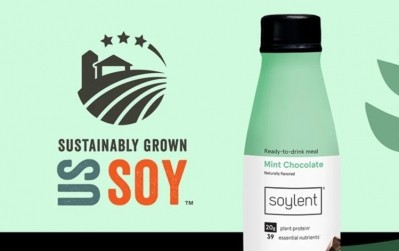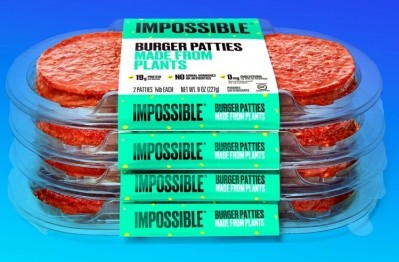Impossible Foods slashes prices to retailers: 'We intend to keep lowering prices until we undercut those of ground beef from cows'
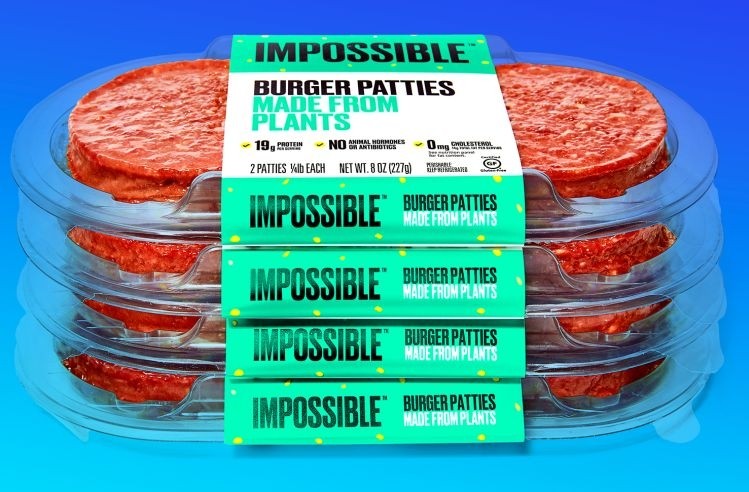
While cutting prices (and denting margins) when demand is apparently “skyrocketing” is unorthodox, the moves reflect Impossible Foods’ growing economies of scale and mission to make plant-based meat more affordable, claims Impossible Foods, which ultimately aims to match, and then undercut, the price of conventional meat.
And there’s still some way to go on that front, acknowledged the Redwood City, CA-based company, which now sells its wares in around 30,000 foodservice locations and 17,000 retail stores from Walmart to Trader Joe’s.
Assuming that retailers pass on the price cuts, for example, 1lb of Impossible patties would retail at around $11, compared to around $6/lb for organic, grass-fed and other premium ground beef from cows; and $5.50/lb for pre-packaged conventional 80/20 beef in patty form, said chief communications officer Rachel Konrad.
1lb of Impossible bricks, meanwhile, would be $9.32, versus $6.50 for premium beef from cows, and $4.50 for 80/20 beef in brick form, she added.
That said, weight by weight price comparisons can be a bit misleading, she said: "Impossible Burgers are still more expensive but remember that there’s the 'shrinkage' issue. Animal-derived beef loses about 25-30% of weight and volume in cooking due to excess water that bleeds out in cooking. Impossible Burger barely shrinks at all (less than 5%)."
'For every $1 spent on Impossible Burger at US grocery stores, 82 cents comes at the direct expense of animal-derived foods'
While Nielsen data (see box below) shows that retail sales of conventional meat rose in double digits over the past 52 weeks, this doesn't mean that plant-based meats are not displacing animal meat (Impossible Foods' stated goal), said Konrad, noting that the vast majority of Impossible Foods' sales come at the expense of animal-derived meat.
“For every $1 spent on Impossible Burger at US grocery stores, 82 cents comes at the direct expense of animal-derived foods -- up from 72 cents per $1 in September 2020 [based on analysis of consumer credit card purchases over the most recent 13-week period from Chicago-based analytics company Numerator].”
‘A tsunami of curiosity trial…’
The key question will be whether early consumer interest in Impossible Foods' retail products will be sustained, said James Richardson, a cultural anthropologist-turned business consultant to emerging CPG brands, who argues that “unicorn-levels of national awareness-building before retail entry have created a tsunami of curiosity trial.”
He told FoodNavigator-USA last month: “The company has ramped up retail distribution so fast that this trial tsunami clouds any definitive analysis of the business... No one has produced a definitive bottoms-up addressable market study of how much of the 80:20 retail beef market is driven by consumers open to anything other than curiosity trial of these otherwise yummy plant-based imitations."
‘A full range of meats and dairy products for every cultural region in the world’
Impossible Foods – which has a stated goal to “produce a full range of meats and dairy products for every cultural region in the world” – recently teased a plant-based milk product “better than anything that comes from a cow,” during a call outlining plans to double the size of the R&D team over the next 12 months. However it is also working on steak, chicken, seafood, and eggs.
Production has increased six-fold since 2019, both in the company’s main plant in Oakland and at multiple plants owned by co-manufacturing partners, added the company, which has raised well over a billion dollars to build its plant-based empire.
Plant-based meat sales +45.1% in latest 52 weeks; conventional meat +18.7%
According to Nielsen data shared with FoodNavigator-USA this week, US retail sales of plant-based meat (frozen and fresh) rose 45.1% to $932.9m in the 52 weeks to January 16, 2021; whereas sales of conventional meat (which dwarfs plant-based meat in scale) surged 18.7% to $72.9bn.
According to SPINS data collected by The Good Food Institute, burgers have the biggest share of the plant-based meat category, followed by sausage links, patties, nuggets, grounds, deli, bacon, and meatballs.
However, in terms of dollar sales growth, the fastest-growing segments are links, grounds, deli meat and meatballs.

